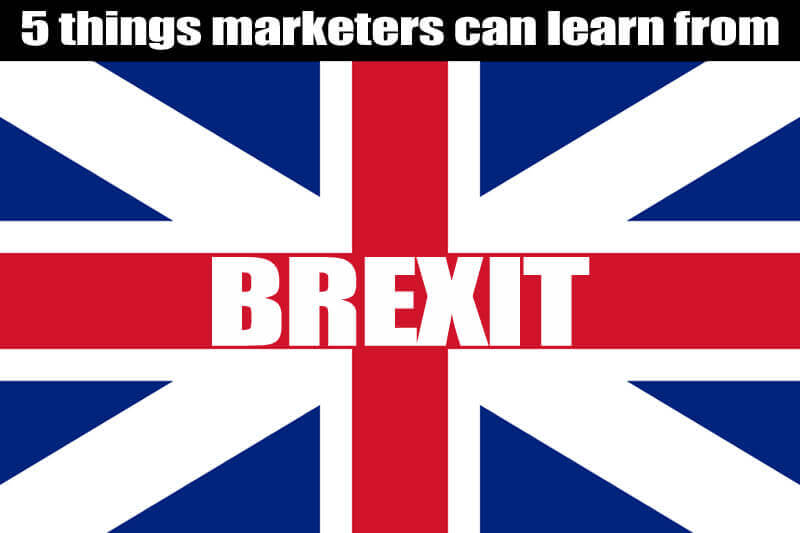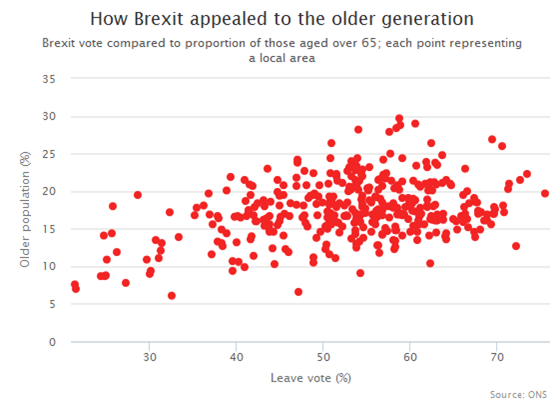It’s safe to say that the recent Brexit referendum has shocked the world – exit voters included. On top of politicians deciding whether to stay or quit, as well as negotiations concerning the future of Britain, there are many lessons to learn from this event that rocked international news. This applies to marketers too.
We have gathered the top five lessons marketers can learn from Brexit:
1. Do your research beforehand
What was more astounding than the referendum results was the aftermath. Google Trends show that there had been a sharp increase in frantic search, after the voting was closed, on basic questions, such as “What is the EU?” and “What does it mean to leave the EU?”
“What is the EU?” is the second top UK question on the EU since the #EURefResults were officially announced pic.twitter.com/1q4VAX3qcm
— GoogleTrends (@GoogleTrends) June 24, 2016
In marketing terms, this is like trying to convince customers to buy your product without knowing how the product benefits your customers, or worse, who your customers could be.
Your relationship with your customers is fragile. That’s why every good marketer and sales person knows that research is necessary, in order to reach out to their customers better and convince them better. Who am I speaking to? What situation is this customer in? What interests this person? When able to answer these questions, the most likely outcome is: you will form an impression that resonates positively with your customers, and your brand remains in their consideration set when making the actual purchase.
2. Analyse data
While it is easy to say the British majority have agreed to leave the EU, deeper analysis shows that there were great differences in the mindset of the young and old. In fact, voters above 65 tended towards voting for the Brexit, whereas the young tended to be against it. Since more young people preferred to reside in big cities, the big cities had a majority of remain votes, whereas the countryside had more leave votes. Therefore, if you speak to someone from the working folklore about the Brexit, you will face a higher probability that the person thinks it was a bad idea.
Similarly, marketers need to track and analyse their data carefully (with the help of a reliable analytics platform) to base their strategic decisions on, before jumping to conclusions. What may seem like trendy channels to invest their marketing spend may not be necessary, as these channels may not speak to their target group. By making sense of their marketing data, marketers can better understand customers’ behaviour and thereby make smarter investments and boost ROI.
3. Think short-term and long-term
Following the Brexit, a survey studied the patterns of different age groups further split down and the percentage within each group that voted leave. Interestingly, the older the voters, the higher the chances they voted leave. This led to an uproar as the young will have to live with this referendum’s outcome, whereas the old ignore the long-term effects.
In marketing, there needs to be some planning in your communications strategy as well. For instance, if your brand is new in the market, there needs to be some planned consistency in all your marketing messages for a recognisable corporate branding. If your brand is big in the market, any negative news tends to be magnified, such as poor environmental awareness, use of child labour, etc. And depending on your reaction, doing too much may be seen as defensive, while ignoring it could be perceived as guilt. Therefore: plan, plan, plan.
4. Don’t burn bridges with your partners
In Nigel Farage’s first post-Brexit speech to the European Parliament, he said, “What I’d like to see is a grownup and sensible attitude to how we negotiate a different relationship. I know that virtually none of you have never done a proper job in your lives, or worked in business, or worked in trade, or indeed ever created a job. But listen, just listen.” It was an interesting speech. But naturally, the members of parliament spent the rest of his speech unwilling to listen.
Many brands owe a significant fraction of their success to strategic partnerships, be it brand ambassadors, networks or publishers. These partnerships lend their voice to the brand and exert influence on their circle, which often has more effect than a regular banner ad online. Therefore, before joking about them being incompetent, it is crucial to nurture the relationships for the long run.
5. Stay true to your brand
Within days after the referendum, both front runners of the Pro-Brexit campaigns Boris Johnson and Nigel Farage have led it, won it and quit. As the saying from the best Brit goes, “Well roared, lion”. (That was Shakespeare.) This led to a new uproar about them leading the country into a crisis and abandoning their country folk. Nigel Farage prefers to only keep his job in the EU parliament, so he can “return to his ordinary life and go fishing”. Names are being called.
In marketing, it is important to stay true to your brand. If (just hypothetically) The Body Shop was found supporting mishandled animals, or if Hilton Hotels welcomed their guests with disposable cups, the brands would have fallen apart. Because customers have a clear expectation when it comes to such brands, any inconsistency displaces them, and not in a good way.
In short, dear marketers: know your customers and watch what messages you are giving off to your customers!






























